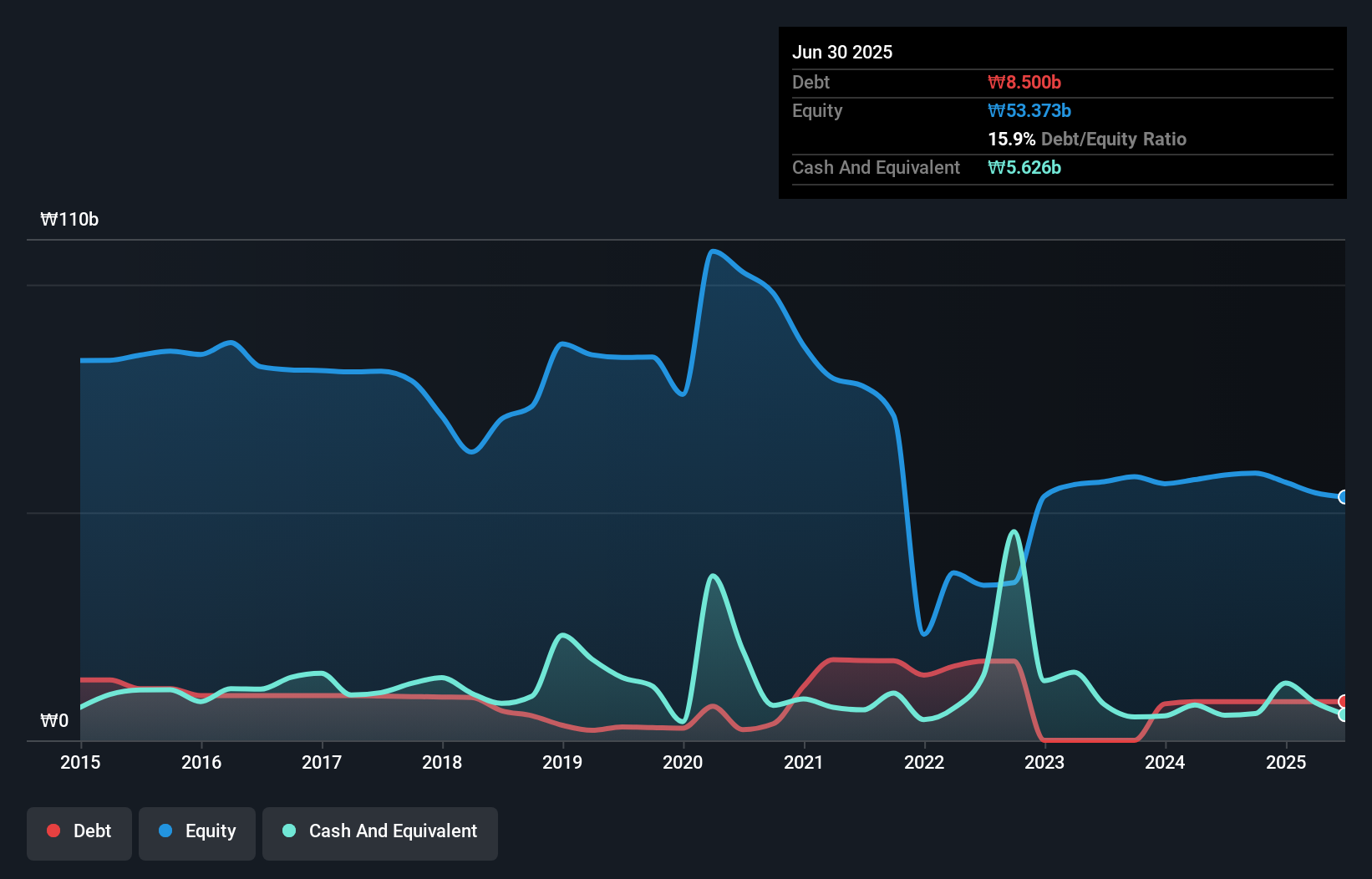Legendary fund manager Li Lu (who Charlie Munger backed) once said, 'The biggest investment risk is not the volatility of prices, but whether you will suffer a permanent loss of capital.' So it seems the smart money knows that debt - which is usually involved in bankruptcies - is a very important factor, when you assess how risky a company is. We note that GOODPEOPLE Co., Ltd. (KOSDAQ:033340) does have debt on its balance sheet. But the real question is whether this debt is making the company risky.
Why Does Debt Bring Risk?
Debt is a tool to help businesses grow, but if a business is incapable of paying off its lenders, then it exists at their mercy. In the worst case scenario, a company can go bankrupt if it cannot pay its creditors. While that is not too common, we often do see indebted companies permanently diluting shareholders because lenders force them to raise capital at a distressed price. Of course, debt can be an important tool in businesses, particularly capital heavy businesses. The first step when considering a company's debt levels is to consider its cash and debt together.
What Is GOODPEOPLE's Net Debt?
As you can see below, GOODPEOPLE had ₩8.50b of debt, at June 2025, which is about the same as the year before. You can click the chart for greater detail. However, it also had ₩5.63b in cash, and so its net debt is ₩2.87b.

How Strong Is GOODPEOPLE's Balance Sheet?
Zooming in on the latest balance sheet data, we can see that GOODPEOPLE had liabilities of ₩17.9b due within 12 months and liabilities of ₩9.18b due beyond that. Offsetting this, it had ₩5.63b in cash and ₩7.86b in receivables that were due within 12 months. So it has liabilities totalling ₩13.6b more than its cash and near-term receivables, combined.
Since publicly traded GOODPEOPLE shares are worth a total of ₩193.9b, it seems unlikely that this level of liabilities would be a major threat. But there are sufficient liabilities that we would certainly recommend shareholders continue to monitor the balance sheet, going forward. Carrying virtually no net debt, GOODPEOPLE has a very light debt load indeed. The balance sheet is clearly the area to focus on when you are analysing debt. But you can't view debt in total isolation; since GOODPEOPLE will need earnings to service that debt. So when considering debt, it's definitely worth looking at the earnings trend. Click here for an interactive snapshot.
Check out our latest analysis for GOODPEOPLE
Over 12 months, GOODPEOPLE made a loss at the EBIT level, and saw its revenue drop to ₩83b, which is a fall of 3.3%. We would much prefer see growth.
Caveat Emptor
Importantly, GOODPEOPLE had an earnings before interest and tax (EBIT) loss over the last year. Indeed, it lost ₩3.4b at the EBIT level. When we look at that and recall the liabilities on its balance sheet, relative to cash, it seems unwise to us for the company to have any debt. Quite frankly we think the balance sheet is far from match-fit, although it could be improved with time. However, it doesn't help that it burned through ₩4.1b of cash over the last year. So to be blunt we think it is risky. There's no doubt that we learn most about debt from the balance sheet. But ultimately, every company can contain risks that exist outside of the balance sheet. Case in point: We've spotted 1 warning sign for GOODPEOPLE you should be aware of.
At the end of the day, it's often better to focus on companies that are free from net debt. You can access our special list of such companies (all with a track record of profit growth). It's free.
New: Manage All Your Stock Portfolios in One Place
We've created the ultimate portfolio companion for stock investors, and it's free.
• Connect an unlimited number of Portfolios and see your total in one currency
• Be alerted to new Warning Signs or Risks via email or mobile
• Track the Fair Value of your stocks
Have feedback on this article? Concerned about the content? Get in touch with us directly. Alternatively, email editorial-team (at) simplywallst.com.
This article by Simply Wall St is general in nature. We provide commentary based on historical data and analyst forecasts only using an unbiased methodology and our articles are not intended to be financial advice. It does not constitute a recommendation to buy or sell any stock, and does not take account of your objectives, or your financial situation. We aim to bring you long-term focused analysis driven by fundamental data. Note that our analysis may not factor in the latest price-sensitive company announcements or qualitative material. Simply Wall St has no position in any stocks mentioned.
About KOSDAQ:A033340
GOODPEOPLE
Engages in the manufacture, wholesale, and sale of underwear products for women and men in South Korea and internationally.
Mediocre balance sheet with minimal risk.
Market Insights
Community Narratives





